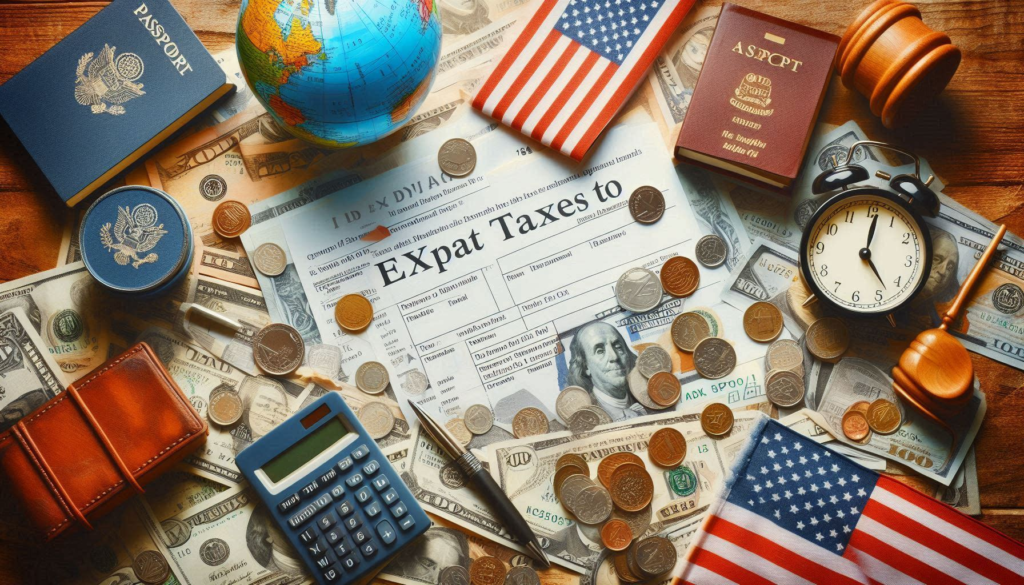For US Citizens living abroad, understanding US Taxes can be challenging and overwhelming. It is important to know the rules and regulations governing US taxes to stay compliant with IRS and avoid huge fines and penalties.
US Citizens living abroad often referred to as expats; are required to file their US income tax returns just like individuals living in the United States. Expat Taxes for US Citizens Living Abroad can be different and more complex due to their international status.
Even if you are earning your income abroad, you are subject to US tax laws, which can result in significant financial consequences if ignored. This comprehensive guide will explore every point that you need to know about American Tax for US residents living abroad, right from fulfilling requirements to strategies for reducing your tax burden.

Do American Citizens pay taxes if they live Abroad?
Yes, US citizens have to pay taxes on their foreign income if they meet the filing thresholds that are equal to the standard deduction for their filing status. US taxes are based on citizenship, not country of residence. That means it does not matter where one calls home, if you are a US citizen, you have a tax obligation every tax year.
The expat tax filing needs of a Non-resident US citizen do not change if they are paid by a foreign employer overseas. Apart from Federal tax for non residents, some US citizens living abroad also need to file state taxes based on their last residence.
The taxable foreign income includes wages, interest, dividends, rental income, and qualified retirement account distributions. Also, if you have foreign financial accounts or assets, you may need to report them.
America requires citizens to disclose international financial accounts that held $ 10,000 or more at any one time in the year. They have to file FBAR or the Foreign Bank Account Report. If their foreign assets with a value greater than $ 200,000 they have to file FATCA Form 8938.

If you are a US expat and are unaware of tax filing obligations, the IRS has built a safe-guard for honest expats with its streamlined filing compliance procedures. To quality it; the expat must,
- Have lived in a foreign country for at least 330 days, during one of the last three years.
- Confirm it was a genuine mistake you failed to file your US tax return and FBAR.
What are the key filing requirements for the US Expat Taxes?
The key requirements of Tax filing for US Citizens living abroad the ex-pats need to be aware of are-
- Form 1040: Every US Citizen must file Form 1040 annually to report their worldwide income. The US expats settled abroad and earning income from foreign sources have to report that income on their US tax return. Filing deadlines for expats are extended automatically to June 15 but any taxes owed must still be paid by April 15 to avoid interest charges.
- FEIE 2555: FEIE or the Foreign Earned Income Exclusion allows the ex-pats to exclude a certain amount of foreign-earned income from American Taxes, provided they meet certain criteria. For the tax year 2024, the exclusion limit is $ 126, 500. To qualify the expat must meet either a physical presence test of 330 days in a foreign country during 12 months or a Bona Fide Residence Test.
- Form 1116: If the expat pays taxes to the foreign government, they may be eligible for the Foreign Tax Credit or FTC. It provides a dollar-to-dollar reduction in your US tax liability, Form 1116 is used to claim this credit. This credit can help prevent double taxation-paying for expats, taxes to the US, and the country of their residence.
- FinCEN Form 114: If the expat has a foreign bank account with a combined value exceeding $ 10,000 at any point during the year, they must file an FBAR. This form is not part of their tax return and is filed separately with the financial crimes enforcement network. The FBAR is due by April 15 though an automatic extension to October is available.
- Form 8938: The Foreign Account Tax Compliance Act requires US citizens to report their foreign financial assets on Form 8938 if those assets exceed certain thresholds. For US expats living abroad, the thresholds are $ 200,000 for single filers and $ 400,000 for married couples filing jointly.

What Is Double Taxation and How to Avoid it?
One of the main concerns for US expats is double taxation. Double Taxation is being taxed both by the US and the foreign country in which the expats live and work. However, the IRS has several provisions to reduce or eliminate the burden of double taxation on American Expats.
- Foreign Earned Income Exclusion (FEIE): FEIE allows the ex-pats to exclude up to $ 120,000 of foreign-earned income from US taxes, provided they meet the qualifying criteria. This exclusion applies to income earned for work performed in a foreign country, so it does not apply to income from investments or US Sources.
- Foreign Tax Credit (FTC): The Foreign Tax Credit lets one claim a credit for foreign taxes paid on income subject to US taxes. It is beneficial if the expat lives in a high-tax country where the tax rates are higher than in the US.
- Tax Treaties: The United States of America has tax treaties with many countries to reduce the risk of double taxation. These treaties provide favorable tax treatment on income like pensions, dividends, and royalties and may allow for the reduction or elimination of certain taxes.
What are the Tax Deductions and Benefits for Expats?
American Expats living abroad are entitled to various tax deductions and benefits that can help reduce their tax liability. These include-
- Foreign Housing Exclusion: Apart from FEIE, US expats can exclude or deduct certain foreign housing expenses, such as rent, utilities, and property insurance. To quality, the expats must meet the requirements for FEIE and use Form 2555 to claim the foreign housing exclusion or deduction.
- Child Tax Credit: If the expat has dependent children, they may be eligible for the Child Tax Credit, even if they are living abroad. The credit is worth up to $ 2000 per child, though the refundable portion is limited for expats. To claim this credit the expats have to fill Form 8812.
- Retirement Account Contributions: If the expat is contributing to a US-based retirement plan, such as a 401 (k) or IRA, they can still receive tax benefits. However, some foreign retirement accounts may have complex reporting requirements under FATCA and FBAR rules. Consult a good expat tax advisor to help you navigate this process.
What are the self-employment taxes for US expats?
If an expat is self-employed they are subject to the US self-employment taxes even if they have no US-based income. Self-employment tax for the US expats is essentially Social Security and Medicare taxes. It does not include any other taxes. It helps pay retirement, disability, and survivorship. Medicare helps with health insurance and benefits a US expat can receive when they become a senior.
The threshold for filing US tax for self-employed US Citizens living abroad is very low. If the net earnings of the expat exceed $400 in the tax year 2023, they must file their taxes. They need to file a Schedule C Form, which is a form that reports their profits or losses from the Expat’s Company to the IRS.
If the expat is both an employer and an employee then they must pay the tax separately after calculating their net profit. The process is similar to what wage earners in the US do to withhold their pay. To file the self-employment tax the expat needs to use Schedule SE on Form 1040 or 1040 –SR.
As per the IRS, the US expats who are self-employed will be taxed at 12.4% for social security, which can be offset through tax provisions. There is an additional tax of 2.9% on all the earnings to take care of the Medicare portion.
What are the Penalties for Non-Compliance of US income tax by the Expats?
Us Income Tax For Us Citizens Living Abroad is mandatory. Failing to file the US taxes or required forms, such as FBAR or Form 8938 can result in severe penalties. For instance, the penalty for not filing an FBAR is up to $ 10,000 per violation. Any willful violation can result in even steeper fines and criminal charges. Non-compliance with FATCA can lead to penalties of $ 10, 000 for failure to file Form 8938, with additional penalties for continued non-compliance.
If the ex-pats have missed filing in previous years, the IRS offers various amnesty programs, such as streamlined foreign offshore procedures that allow the ex-pats to become compliant without facing penalties in most cases.

What are the State Tax Obligations for Expats?
Apart from federal taxes, US expats may still have obligations to their home state. If you maintain residency in a state, you may be required to file state taxes. Some states like New York and California have more stringent residency requirements and may continue to tax the expats even if they live abroad. Texas and Florida have no income tax, which may relieve the expats from additional tax burden.
Hiring a professional tax service provider for your Expat Taxes?
Expat taxes are complicated and many US citizens living abroad choose to hire a professional tax expert who specializes in this area. A reputable tax advisor with experience in international tax issues can help ensure compliance with all the US tax laws while also reducing the tax burden through deductions, credits, and exclusions.
If you are an American Expat, you have unique tax responsibilities. It is important to stay compliant with the US tax laws to avoid huge fines and penalties from the IRS. It is important for the US expats to thoroughly understand various forms, deadlines, and provisions available for the expats.
For peace of mind and to avoid costly penalties, it is advisable to consult a tax professional who specializes in expat taxes. The expat tax professional will table the right strategies, helping the expats navigate the complexities of the US tax system and enjoy their life abroad without unwanted financial stress.
Frequently Asked Questions
- Do the American Citizens living abroad have to pay US taxes?
Yes, American Citizens and Green Card Holders must report and pay tax on their worldwide income, irrespective of where they live. This is because the US is one of those few countries that follows a citizenship-based taxation system, which means you are required to file US tax returns even while living abroad. - What is the deadline for filing US taxes while living abroad?
The regular filing deadline is April 15, but US expats receive an automatic extension to June 17. However, if the expat owes taxes, they must be paid by April 15 to avoid huge interest. Expats can also request an additional extension until October 15. - How an Expat can avoid Double Taxation?
US expats living abroad can avoid double taxation through FEIE and FTC. The FEIE excludes a portion of the foreign-earned income from US taxes and FTC offers a dollar-for-dollar reduction for taxes paid to a foreign government on income taxed by the US. - What happens if the US expats living abroad do not file their US taxes?
Failing to file the expat taxes on time can invite huge IRS penalties. However, the IRS offers amnesty programs like Streamlined Foreign Offshore Procedures to help expats become compliant without penalties. - Do expats have to file state taxes?
It depends on their residency status in a particular state. If the expats maintain residency in a state, especially in high-tax states like New York or California, they may need to file state taxes. Some states like Florida and Texas have no income tax which may relieve the expats from this requirement.
